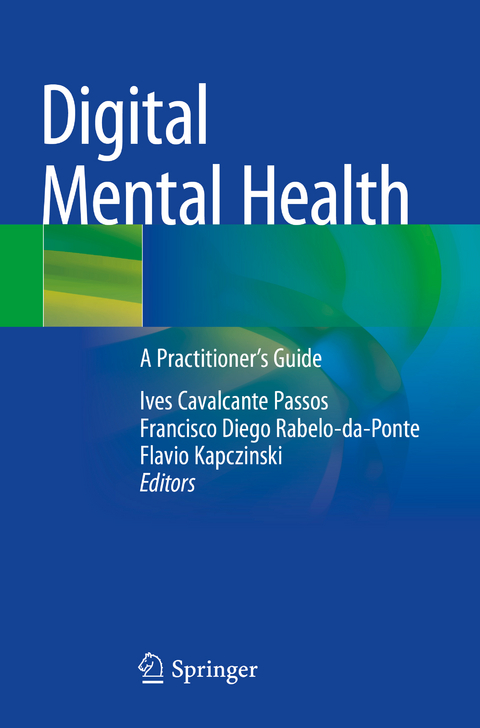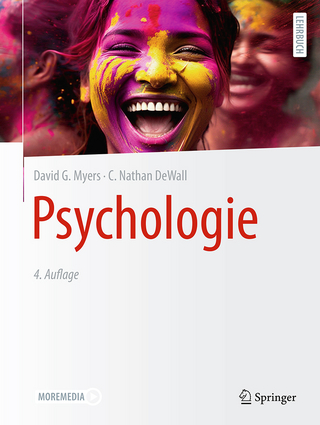
Digital Mental Health
Springer International Publishing (Verlag)
978-3-031-10700-9 (ISBN)
Digital Mental Health will help clinicians and researchers, especially psychiatrists and psychologists, to define measures and to determine how to test apps or usefulness, feasibility and efficacy in order to develop a consensus about reliability. These professionals will be armed with the latest evidence as well as prepared to a new age of mental health.
Ives Cavalcante Passos, MD, PhD, is a professor of psychiatry at the Universidade Federal do Rio Grande do Sul (UFRGS), Brazil. He completed his postdoctoral neuroscience and artificial intelligence at the University of Texas Health Science Center at Houston (UTHealth) - Houston, Texas USA. In 2016, he was selected as Young Physician Leader by the Interacademy Medical Panel and M8 Alliance of Academic Health Centers. Dr. Passos has a total of 97 peer-reviewed articles published in top psychiatric journals in Pubmed. He has also published a Springer book entitled "Personalized Psychiatry - Big Data Analytics in Mental Health".
Francisco Diego Rabelo-da-Ponte is a psychologist. He completed his M.Sc and Ph.D in psychiatry and behavioral sciences at the Federal University of Rio Grande do Sul, Brazil. He was visiting PhD student at the University of Central Lancashire (UK) focused on neurodevelopment and neuroimmunology. In 2019, Rabelo-da-Ponte received the Samuel Gershon Award for Junior Investigators organized by International Society for Bipolar Disorders (ISBD). In 2020, he received the International Travel Grant Award from the International Brain Research Organization (IBRO). Dr. Rabelo-da-Ponte has a total of 26 peer-reviewed articles in top psychiatric journals in Pubmed. Currently, he is a post-doctorate researcher at King's College of London.
Flávio Kapczinski, MD, PhD, is a leader in the field of research on bipolar disorder and a Professor of Psychiatry at McMaster University. Prof. Kapczinski has also served as a mentor, with several former trainees currently occupying important academic positions around the globe. Currently he is among the three most productive researchers in the field of bipolar disorder, and among the five most influential researchers in psychiatry in Canada. In 2013, he received the Mogens Schou Prize for Education from the International Society of bipolar disorders. Clarivate Inc (formerly Thomson Reuters) lists Prof. Kapczinski among the most influential minds in academia, and he has a total of 548 peer-reviewed articles in Pubmed. He published a total of 8 books, including the Springer book entitled "Personalized Psychiatry - Big Data Analytics in Mental Health".
1. The Dawn of Digital Psychiatry.- 2. Digital Biomarkers and Passive Digital Indicators of Generalized Anxiety Disorder.- 3. Digital phenotyping in mood disorders.- 4. Mental health assessment via Internet: the psychometrics in the digital era.- 5. Smartphone-based treatment in psychiatry - a systematic review.- 6. Digital therapies for insomnia.- 7. The efficacy of smartphone-based interventions in bipolar disorder.- 8. Chatbots in the field of mental health: challenges and opportunities.- 9. How to evaluate a mobile app and advise your patient about it?.- 10. Telepsychiatry.- 11. Prediction of suicide risk using machine learning and big data.- 12. Electronic Health Records to Detect Psychosis Risk.- 13. The use of artificial intelligence to identify trajectories of severe mental disorders.- 14. The use of machine-learning techniques to solve problems in forensic psychiatry.- 15. Gaming Disorder and Problematic Use of Social Media.
| Erscheinungsdatum | 04.01.2024 |
|---|---|
| Zusatzinfo | XIV, 259 p. 16 illus. in color. |
| Verlagsort | Cham |
| Sprache | englisch |
| Maße | 155 x 235 mm |
| Gewicht | 523 g |
| Themenwelt | Geisteswissenschaften ► Psychologie ► Klinische Psychologie |
| Medizin / Pharmazie ► Allgemeines / Lexika | |
| Medizin / Pharmazie ► Medizinische Fachgebiete ► Psychiatrie / Psychotherapie | |
| Schlagworte | digital mental health • digital psychiatry • e-Mental Health • e-psychotherapy • telehealth • Telepsychiatry • telepsychotherapy • web- and Internet-based health services |
| ISBN-10 | 3-031-10700-4 / 3031107004 |
| ISBN-13 | 978-3-031-10700-9 / 9783031107009 |
| Zustand | Neuware |
| Haben Sie eine Frage zum Produkt? |
aus dem Bereich


